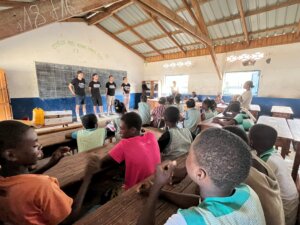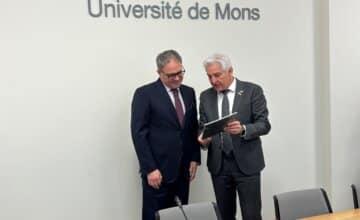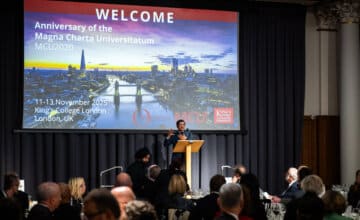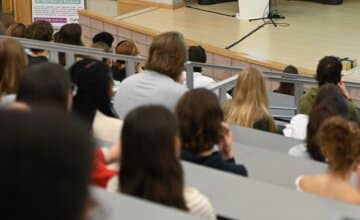The Children’s University takes root in Madagascar: a promising 2025 edition
 The third edition of the Université des Enfants à Madagascar (UDEMA) was held in the town of Tuléar, in south-western Madagascar.
The third edition of the Université des Enfants à Madagascar (UDEMA) was held in the town of Tuléar, in south-western Madagascar.
For several days, over 300 participants, including more than 200 children, took part in fun and participative scientific activities: conferences adapted to the youngest, screenings, workshops, practical activities, moments of exchange… All the ingredients were brought together to make this edition a real success.
This project, which runs in parallel with the “Biodiversity and Ecology of Coral Reefs” Master’s degree course, bears witness to an exemplary synergy between the University of Mons (UMONS) and the University of Tuléar, via its Institut Halieutique et des Sciences Marines (IHSM).
For the past four years, this internship has welcomed Belgian students for four weeks of hands-on training in a unique ecosystem. One of the program’s four modules is devoted to science popularization, an essential component of the course, supported by the Mons University Museum (MUMONS).
Year on year, UDEMA is gaining momentum in this island state in the Indian Ocean. The aim is clear: to broaden its impact and reach more children, including those from the most disadvantaged backgrounds, while training new local relays. In fact, the 2025 edition set a new benchmark, both in terms of the number of participants and the diversity of activities on offer, often centred on biodiversity. The children didn’t just listen: they interacted, debated and sometimes even took it upon themselves to explain certain phenomena to the Vazahas, the Malagasy term for foreigners of European origin.
“The desire to understand is everywhere, but tools and opportunities are still rare here. The dynamic has only just been launched here,” explains Alexia Lourtie, scientific mediator in biology and ecology at UMONS and scientific coordinator of UDEMA. “Our ambition is for the Children’s University in Madagascar to become increasingly independent, so that it can live and develop locally with Madagascans trained in scientific mediation,” she adds.
An urgent need in a country where popularization is still a luxury
The need to structure scientific mediation in Madagascar comes up against an implacable socio-economic reality. “Madagascar is the fifth poorest country in the world. Over there, popularizing science is a luxury”, says Guillaume Caulier, PhD in biology and head of research at UMONS’ Biologie des Organismes Marins et Biomimétisme (BOMB) laboratory. “And yet, demand is enormous: local schools are very keen on these activities, teachers are short of materials, and children are extremely receptive,” adds Alexia Lourtie.
Faced with this demand, the project leaders have come up with concrete, accessible solutions: the Children’s University teaching sheets will soon be translated into Malagasy, to be used directly by local teachers and organizers. Not to mention the book “L’université des enfants en vadrouille”. The aim of this fieldwork is to anchor the approach for the long term, in a spirit of co-creation and cultural adaptation.
Towards a permanent space for shared knowledge
To guarantee the continuity and autonomy of this dynamic, a major project is underway: the creation of a Knowledge Space within the University of Tuléar. This Belgian-Malagasy project is based on a solid collaboration between a number of players: Master’s students from the University of Tuléar and UMONS, academic teams from the Biology of Marine Organisms and Biomimicry laboratory at UMONS and the IHSM (University of Tuléar), MUMONS mediators and the locally-based NGO Bel Avenir.
The Espace des Savoirs is a structured and accessible space dedicated to disseminating science to young children in the local community. Led by teachers, PhD and Master’s students, it will offer educational activities based on the active method and mediation tools adapted to the 6-12 age group.
This infrastructure will contribute to the professionalization of popularization in Madagascar, while serving a dual purpose:
- For children, it will encourage critical thinking, the manipulation of simple scientific tools, and a better understanding of the world around them.
- For supervisors, it will strengthen the ability to translate complex knowledge to non-specialist audiences, reinforcing the link between science, education and society.
A window on major global issues
Far from limiting itself to the simple transmission of content, UDEMA is part of a broader dynamic of education for global citizenship. The issues addressed – biodiversity, climate, health, ecosystems – are universal, but here they are dealt with from a local, intercultural perspective, rooted in the realities of the region. Through UDEMA, children, students and scientists co-construct a space of shared knowledge, where each can contribute their vision and experience, and learn from the other.
The Université des Enfants à Madagascar is much more than a one-off project. It’s a human, scientific and educational adventure that grows from year to year, building bridges between continents, generations and knowledge. With the forthcoming creation of the Espace des Savoirs, UDEMA is embarking on a new phase in its development, guided by a strong desire to offer young Madagascans the keys to understanding the world, the tools to take action, and above all… the curiosity to learn, always.
Discover the video of the 2025 edition and a photo gallery below:
















